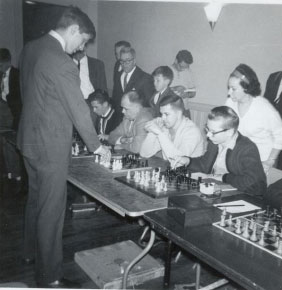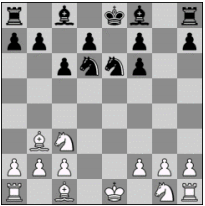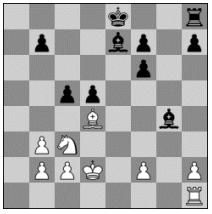 In March 1964, reigning U.S. Champion Bobby Fischer played a 56-board simul at Fitchburg’s Wachusett Chess Club. Harold Dondis, who was instrumental in organizing the event, would also emerge as one of the winning participants. This is his story. In March 1964, reigning U.S. Champion Bobby Fischer played a 56-board simul at Fitchburg’s Wachusett Chess Club. Harold Dondis, who was instrumental in organizing the event, would also emerge as one of the winning participants. This is his story.
With the possible exception of the Beatles, who had just arrived in the United States, no one was hotter in early 1964 than GM Robert Fischer. The 20-year-old was no longer an up-and-coming chess prodigy, but a fully formed professional, fresh off an 11-0-0 sweep (!) of the U.S. Championship. It came as a surprise, then, when Fischer forewent participation in that year’s Amsterdam Interzonal, and the 1966 world championship cycle, for a three-month simul tour of more than three dozen U.S. cities.
Harold Dondis, then president of the Massachusetts State Chess Association (MACA’s predecessor), and organizer George Mirijanian were eager to set something up in Massachusetts, so they contacted Fischer. After an initial misunderstanding of the GM’s price quote,Dondis arranged for Fischer to come to the Wachusett Chess Club in Fitchburg, MA, in early March. The GM would receive $5 a board, a hefty fee in those days equivalent to around $37 in today’s money, anticipating fifty players.
To his credit, Fischer did not charge for additional players when 56 showed up on March 2nd, 1964. He proceeded to play the games, including one against the MSCA president, in which he made a rather unfortunate choice of opening:
GM Robert J. Fischer
Harold B. Dondis
Vienna Game [C27]
Fischer Simul Tour
03.02.1964
1. e4!
Best by test.
1… e5 2. Nc3 Nf6 3. Bc4 Nxe4
In 1976, British chess write Tim Harding dubbed this often chaotic line of the Vienna the Frankenstein-Dracula Variation. It’s not clear whether the gentlemanly Dondis would have ventured into this line had it held that moniker, but it did not, as these were more gentlemanly times, after all.
4. Qh5 Nd6 5. Bb3 Nc6 6. d4?!
6. Nb5 is the main move, typically followed by 6… g6 7. Qf3 f5 8. Qd5 Qe7 9. Nxc7+ Kd8 10. Nxa8 b6. These ten moves had begun highly publicized games between Massachusetts chess icons Weaver Adams and Harry Lyman, played in 1940 and 1946, respectively. In both games, Adams played other games to tend to. Whatever the case, the move he chose offered little. Those wary of White’s chances in the more adventurous continuation may opt for 5.Qxe5+ Qe7 6.Qxe7+ Bxe7 7.Be2, a line recommended by Swedish Grandmaster Ulf Andersson, who contends that it bears some slight advantage. Of course, such a meager positional edge would also be unpleasant for a simultaneous exhibitioner.
6… Nxd4 7. Nd5 Ne6 8. Qxe5 c6 9. Nc3 Qf6 10. Qxf6 gxf6
White, and in both he lost. Dondis was keenly aware of this, being a close friend and occasional study partner of Lyman’s. Perhaps this discouraged Fischer from venturing into the main line, or perhaps it was a general disfavor of such chaos with 55 other games to tend to. Whatever the case, the move he chose offered little. Those wary of White’s chances in the more adventurous continuation may opt for 5.Qxe5+ Qe7 6.Qxe7+ Bxe7 7.Be2, a line recommended by Swedish Grandmaster Ulf Andersson, who contends that it bears some slight advantage. Of course, such a meager positional edge would also be unpleasant for a simultaneous exhibitioner.
6… Nxd4 7. Nd5 Ne6 8. Qxe5 c6 9. Nc3 Qf6 10. Qxf6 gxf6

As peculiar as it appears, this position is perfectly fine for black. Development will be completed by virtue of a d5 advance, which in turn solidifies an advantage in the center, and the exchange of queens should ease concerns about the doubling of pawns and developmental lag.
11. Nge2 Nf5 12. g4 Nfd4 13. Nxd4 Nxd4 14. Be3 Nxb3
With the bishop pair, Black further improves strong endgame prospects.
15. axb3 d5 16. Rxa7 Rxa7 17. Bxa7 Bxg4 18. Bd4 Be7 19. Kd2?? c5
A disastrous blunder in an already miserable position. Though this certainly sped up the process, Mr. Dondis should be commended for making the most of an opening advantage through highly accurate play.

Though Harold’s game ended relatively early, he waited for his friend David Scheffer, who had given him a ride to the event. Mr. Scheffer was embroiled in a long game, in which he too would ultimately triumph over the champion! Following the games, the two got a glimpse of the erratic behavior for which Fischer would later become infamous. According to Dondis:
“After the simul, I went downstairs, where a few fans were asking Bobby questions. He would not look at them, and stood facing the wall. Asked about his chances against Petrosian, he misquoted their record against each other and said he could win. He suddenly walked off without any goodbyes. Dave and I were so charged up that we lost our way at night in returning to the Boston area.”
They eventually made it back, of course.
Fischer’s 49-5-2 result at Wachusett would be one of the weaker performances on his tour. In around 2000 exhibition games, he posted a win rate near 94%, dominance by an all-timer in his prime. Dondis, now 91, continues to be one of the most active players in the state, playing mostly at the Boylston Chess Club. But even in a career as prolific as his own, a win over Fischer will always be special.
Photo courtesy of Wachusett Chess Club
Photo credit: Lester Gabricz |